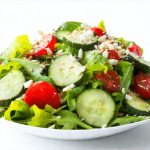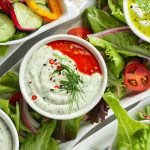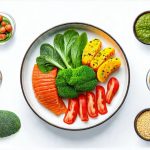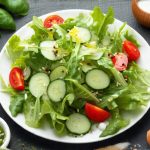The humble salad – often touted as a cornerstone of healthy eating. It’s a vibrant mix of greens, vegetables, and sometimes fruits, promising vitality and nourishment. But for many, this supposed beacon of wellness can quickly turn into a source of discomfort: bloating, gas, and general digestive distress. This isn’t necessarily an indication that salads are bad for you, but rather a sign that something within your salad – or the way you’re consuming it – might not be agreeing with your gut. It’s crucial to understand this discrepancy between perceived healthiness and actual physiological response, as it prevents people from enjoying, or even attempting, a diet rich in fresh produce.
The issue isn’t usually the vegetables themselves; they are packed with essential vitamins, minerals, and fiber that our bodies need. Instead, bloating from salads often stems from combinations of ingredients, preparation methods, individual sensitivities, or simply eating habits surrounding salad consumption. Identifying these root causes is key to unlocking a comfortable and beneficial relationship with this nutritional powerhouse. It requires looking beyond the surface – recognizing that a ‘healthy’ food can become problematic based on how it’s integrated into our diet and lifestyle.
Understanding Salad-Related Bloating
Salads, by their very nature, are fiber-rich foods. Fiber is fantastic for overall health, promoting regularity and feeding beneficial gut bacteria. However, a sudden increase in fiber intake – or consuming large quantities at once – can overwhelm the digestive system, leading to gas and bloating. This is particularly true if your body isn’t accustomed to high-fiber diets. The discomfort arises because our bodies need time to adapt to processing higher amounts of fiber, and the gut bacteria responsible for breaking it down produce gas as a byproduct. It’s not a sign of illness, but rather a natural consequence of digestion.
Beyond fiber content, the specific types of vegetables used in salads can also contribute to bloating. Cruciferous vegetables like broccoli, cauliflower, cabbage, and Brussels sprouts contain raffinose, a complex sugar that’s difficult for our bodies to digest. This undigested raffinose ferments in the colon, resulting in gas production. Similarly, onions and garlic contain fructans, another type of carbohydrate that can cause bloating in susceptible individuals. It’s important to note that everyone reacts differently; some people can tolerate these vegetables without issue, while others experience significant discomfort. If you suspect a food intolerance is causing issues, it’s helpful to understand what intolerance symptoms are often missed.
Furthermore, salad dressings are often overlooked culprits. Many commercially produced dressings are high in fructose corn syrup or other sugars, which can contribute to fermentation and bloating. Oil-based dressings, while seemingly healthier, can sometimes slow down digestion due to their higher fat content, leading to a feeling of fullness and discomfort. Even healthy fats, when consumed in excess, can temporarily disrupt digestive processes. The key is mindful selection and portion control. Considering why sauces are a hidden danger zone might help you make better choices.
Identifying Your Personal Triggers
Pinpointing the exact cause of salad-related bloating requires some detective work and self-awareness. Keeping a food diary for a week or two can be incredibly helpful. – Record everything you eat, including specific salad ingredients and dressings. – Note any symptoms experienced (bloating, gas, discomfort) along with the timing and severity. – Pay attention to patterns: Are certain vegetables consistently associated with bloating? Does a particular dressing trigger discomfort?
Once you’ve identified potential triggers, consider an elimination diet. This involves temporarily removing suspected foods from your diet for a period of time (typically two to three weeks), then reintroducing them one at a time to observe any reactions. This is best done under the guidance of a registered dietitian or healthcare professional. It’s not about permanently eliminating foods but rather identifying sensitivities and tailoring your diet accordingly. Remember, individual tolerance varies greatly. If you feel like supplements might be contributing, consider what to do if you react to them.
Another important aspect is chewing thoroughly. Our digestive process begins in the mouth, and proper chewing breaks down food into smaller particles, making it easier for our bodies to digest. When we eat quickly or don’t chew adequately, larger chunks of undigested food reach the colon, where they ferment and produce gas. This can be exacerbated by fibrous vegetables like raw carrots or celery. Taking your time and savoring each bite – truly chewing your salad – can significantly reduce bloating.
The Role of Gut Health
A healthy gut microbiome is essential for optimal digestion. When our gut bacteria are out of balance (dysbiosis), it can lead to increased gas production, inflammation, and digestive discomfort. Salads, especially those rich in fiber, can support a healthy gut microbiome by providing food for beneficial bacteria. However, if you already have an imbalance, introducing large amounts of fiber too quickly can actually worsen symptoms.
Consider incorporating probiotic-rich foods into your diet, such as yogurt, kefir, sauerkraut, or kimchi. These foods contain live cultures that help restore and maintain a healthy gut microbiome. You might also explore prebiotic foods – like garlic, onions, asparagus, and bananas – which feed the beneficial bacteria already present in your gut. However, be mindful of potential sensitivities to prebiotics, as they can sometimes cause bloating in certain individuals. Understanding are seed oils linked to gut reactions is also helpful when considering dietary changes.
Stress management is also surprisingly important for gut health. Stress can disrupt the digestive process and negatively impact the microbiome. Techniques like meditation, yoga, or deep breathing exercises can help reduce stress levels and promote optimal digestion. Remember that a holistic approach – addressing both diet and lifestyle factors – is often most effective in managing bloating and improving overall gut health. Many children experience these issues too; it’s important to understand why some kids are always bloated after meals.
Optimizing Salad Preparation & Consumption
Beyond ingredient choices, how you prepare and consume your salad matters significantly. Pre-soaking legumes (beans, lentils) can reduce their raffinose content, making them easier to digest. Similarly, gently steaming or roasting cruciferous vegetables can help break down some of the complex sugars that cause bloating. Don’t be afraid to experiment with cooking methods to find what works best for you.
Salad dressings should be made from whole, unprocessed ingredients whenever possible. Consider using olive oil, lemon juice, and herbs instead of commercially produced options laden with sugar and artificial additives. Portion control is also key; a small amount of healthy dressing can enhance flavor without overwhelming your digestive system.
Finally, consider the order in which you eat your salad. Eating it before other foods allows for better digestion, as it’s not competing with more complex carbohydrates or proteins. It gives the fiber time to start moving through the digestive tract and helps regulate appetite. Also, avoid drinking large amounts of liquid while eating, as this can dilute digestive enzymes and hinder proper breakdown of food. If you’re struggling to find foods that work for you, consider what to cook when everything triggers you.


















